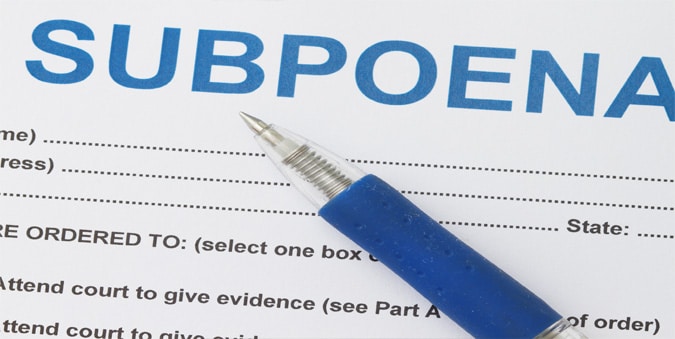Imagine that you are sitting in your office and you receive an envelope with a law firm logo and return address and a certified mail sticker. After you calm down and open the envelope, you notice that there is a caption on the subpoena for a lawsuit and, thankfully, neither you nor your company are named as defendants. After you look more carefully, you determine that the attorney who sent the subpoena has asked for all of your files relating to a project. And they want them the day after tomorrow.
What should you do?
First, consider whether your insurance policy offers assistance to handle subpoenas. To make sure that their insureds do not get in trouble by responding to a subpoena, many insurance companies will help you respond without treating the subpoena as if a claim has been filed against your company. This is a great benefit of these type of insurance policies and you should ask your broker if your policy provides this benefit. If it does, have your broker send the subpoena to the insurance carrier and ask for assistance in responding.
Second, do not just assume that since your name is not in the lawsuit yet, it will not be in the future and treat the document request accordingly. Many times, parties in a lawsuit serve document subpoenas to assess whether a third party should be brought into the case. Keep this in mind when responding, and do not produce anything that you have not reviewed and is not specifically requested in the subpoena. Never produce any document that involves communications with your attorneys because they are privileged. If you have prepared documents thinking that a lawsuit might be coming, those prepared documents may also be protected by the trial preparation privilege and you should not produce them without review.
As a third party (i.e. someone who is not involved in the lawsuit) the South Carolina Rules of Civil Procedure offer you protection because they are designed to protect third parties like you. Rule 45 of the South Carolina Rules of Civil Procedure apply to subpoenas and is accessible on the South Carolina Courts website at https://www.judicial.state.sc.us. You must have an adequate time to respond. In most cases, if you contact the attorney who served the subpoena and ask for more time, they will agree to grant you additional time to respond.
If the subpoena is overly broad or requests confidential information, you have the right to object to the subpoena in writing. Rule 45 provides that an objection must be made within 14 days after the subpoena was served. There is no specific form required for the objection and a letter will be sufficient.
The party requesting the documents is required to pay the reasonable costs of production. This does not mean that this can be a profit center for your company, but you can charge a reasonable retrieval fee and copying cost for the documents.
If you have any question about how to respond to a document subpoena, you should contact your attorney for assistance.

